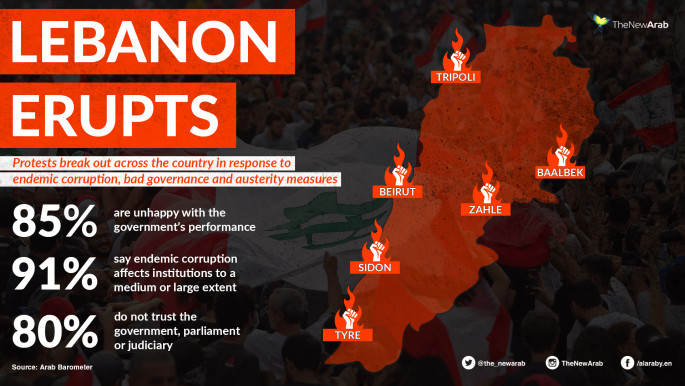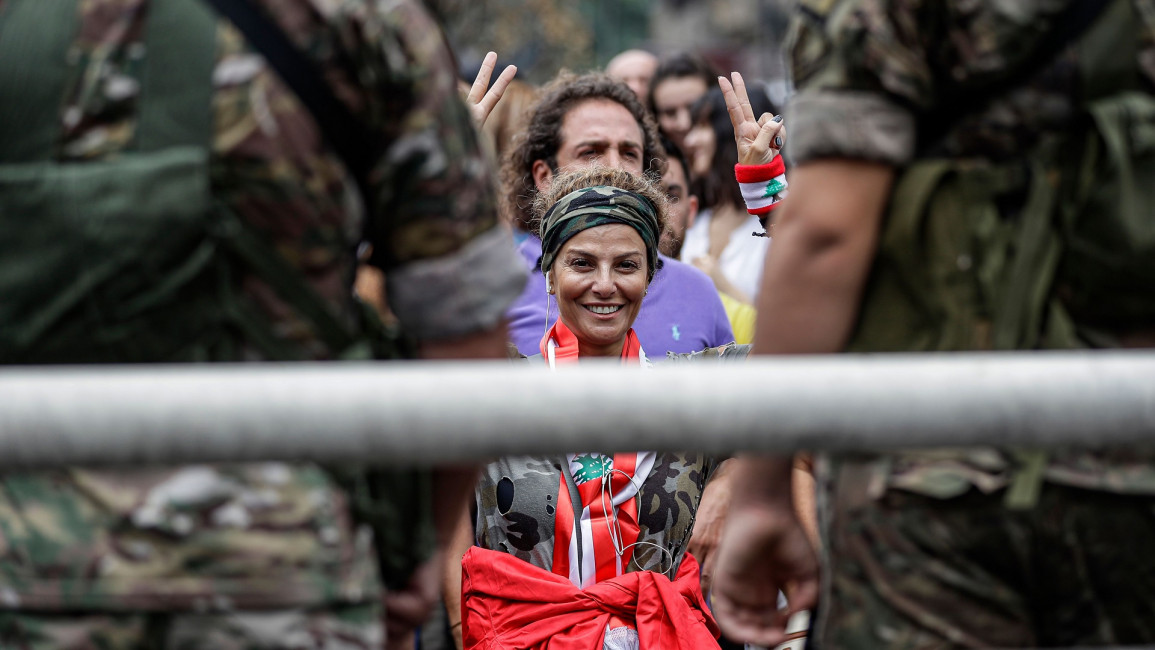Lebanese protesters block roads as anti-corruption movement enters ninth day
Protesters have pledged to continue a civil disobedience campaign until the government gives in to demands to step down.
They have rejected President Michel Aoun's offer to meet the protesters' representatives, and have called on the entire political establishment – including powerful figures such as Hezbollah leader Hassan Nasrallah – to be removed.
Demonstrators have thronged main squares in cities and towns across Lebanon over the past week. Even though numbers have declined since Sunday, the rallies are expected to grow again over the weekend.
Banks, universities and schools remained closed on the ninth day of nationwide protests, triggered by new proposed taxes that followed public spending cuts.
The country's ruling elites have been left unbalanced by the cross-communal nature of the protests, with even traditional support bases of political parties rising up against them.
The protesters have united under the slogan 'All means all', referencing their demand for all political leaders to step down.
Read also: US says Lebanese protesters have 'legitimate' grievances
— Kareem Chehayeb | كريم (@chehayebk) October 25, 2019" style="color:#fff;" class="twitter-post-link" target="_blank">Twitter Post
|
Prime Minister Saad Hariri has tried to calm the anger by pushing through a package of economic reforms and President Michel Aoun has offered to meet with representatives of the protests to discuss their demands.
Both however have been rejected, with the public continuing to block roads and paralyse the country.
"We want to stay on the street to realise our demands and improve the country," one protester, who asked to be identified only by his first name Essam, told AFP.
"We want the regime to fall... The people are hungry and there is no other solution in front of us.”
Nationwide paralysis
Protesters again cut off Beirut's main highways on Friday, blocking the road towards the second city of Tripoli in the north and to the airport. Demonstrators have erected tents and stalls in the middle of the road on the motorway north of Beirut.
There have been attempts by the Lebanese army to clear the protesters and re-open the highways.
Some violence also broke out on Thursday amid a largely peaceful atmosphere when Hezbollah supporters chanted slogans in support of their leader Hassan Nasrallah. The Lebanese Red Cross said six people were taken to hospital.
The partisan support was opposed by other anti-government protesters, who want all the political elites to be removed, including Nasrallah.
Nasrallah was due to give a speech later on Friday.
Lebanon's devastating 25-year civil war entrenched sectarian politics within the system, and many of the current leaders are former commanders. The demonstrations want an end to the sectarian politics, pushing for a freer democratic political system.
Lebanon is one of the world's most indebted countries, with a deficit of around $86 billion - more than 150 percent of gross domestic product - according to the finance ministry.
Public anger surged after parliament passed an austerity budget in July as part of efforts to make reforms that are essential if Lebanon is to unlock over $11 billion in economic assistance pledged by international donors last year.
Growth has plummeted in recent years, with political deadlock compounded by the impact of eight years of war in neighbouring Syria.
 |
|
| [click to enlarge] |
Agencies contributed to this report.
Follow us on Twitter: @The_NewArab


![Minnesota Tim Walz is working to court Muslim voters. [Getty]](/sites/default/files/styles/image_684x385/public/2169747529.jpeg?h=a5f2f23a&itok=b63Wif2V)




![An Israeli air strike on Jabalia killed teenage journalist Hassan Hamad [Screengrab/X]](/sites/default/files/styles/image_330x185/public/2024-10/hassan%20hamad1.jpg?h=c12e0b96&itok=Rd_dyCVp)

![Israeli strikes on Beirut [Getty]](/sites/default/files/styles/image_330x185/public/2176155077.jpeg?h=a5f2f23a&itok=Xq7ypWgM)